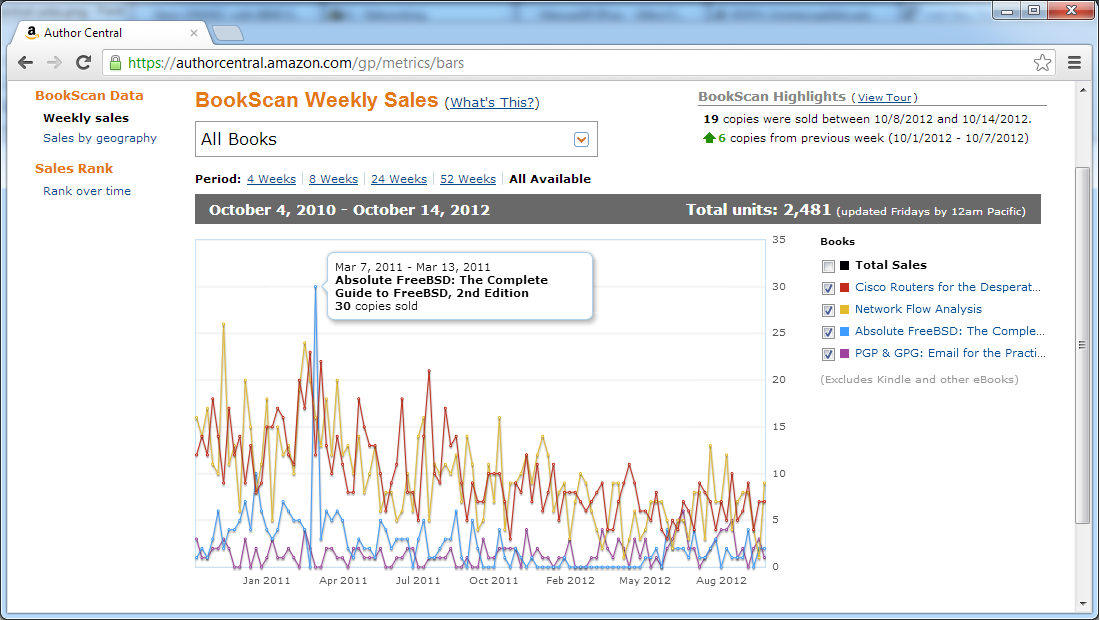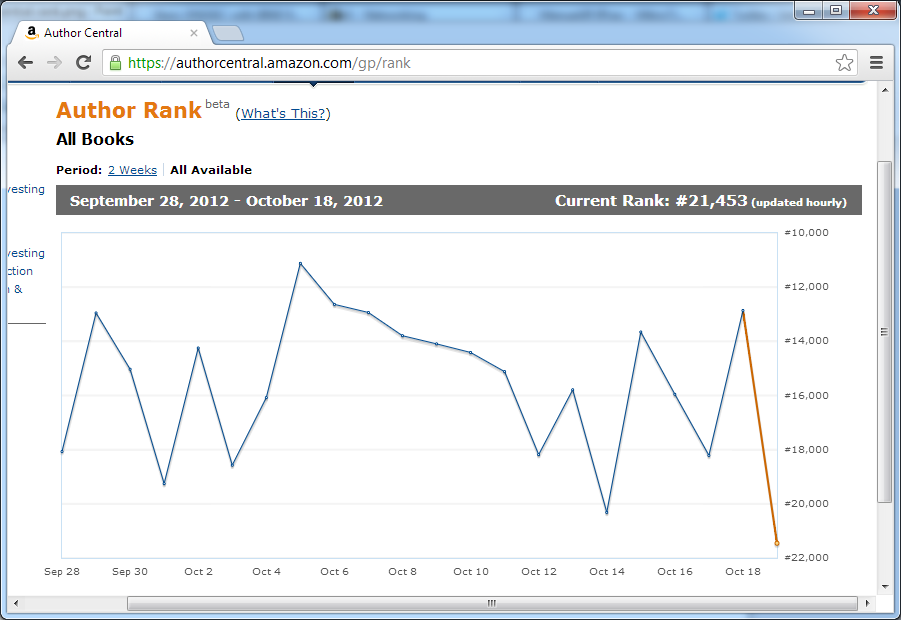Several tech authors recently contacted me for advice about problems with their publishers. (No publisher in particular, mind you.) Apparently I’ve been doing this long enough that I’m considered an expert. I’m writing this post so I can point these people at it later.
If you’re a tech author thinking of asking for my wisdom: this is basically it.
None of this is anything against any particular publisher or any particular writer.
This is not legal advice. I am not a lawyer, nor do I play one on TV, nor do I write stories involving lawyers.
No, I will not look at your publishing contract.
I’ll point you to resources for fiction authors. Genre authors have been bludgeoned over the head repeatedly with this stuff. Tech book authors? Not so much. Most tech authors are technologists first, gamers second, have another hobby or a family or something, and write books as a distant fourth or fifth. Fiction writers who make a living writing have been forced to defend themselves against predatory practices. (“Fool me once, shame on me. Fool me and all of my peers for years, we will gang up on you and burn down your house.”)
Now that the disclaimers are done:
So, you’ve written a tech book. Or you want to write a tech book. You’ve found a publisher. They express interest, and send you a contract. Hurrah! You’re going to be published! An antload of fame and a soupcon of fortune will be yours!
STOP.
Do not sign the contract.
Techies in particular have a disdain for paperwork, but the wrong contract can ruin your life. Even if you know the publisher. Even if the publisher is your best friend, like, ever. Even if you’ve been trained to automatically click on “I accept the license terms.” Overcome that disdain.
READ THE DANGED CONTRACT.
Maybe Microsoft isn’t going to come after you for that extra copy of Windows 95, but your publishing contract is much more personal. It’s aimed at you. And contracts tend to favor the side that writes the contract. Even the most scrupulously even-handed contract by the most good-hearted publisher in the world includes provisions where you agree to do stuff. It’s not as simple as “you write the book, you get paid.”
By signing the contract, you’re agreeing to do what the contract says. The written contract overrides anything verbal. That handshake deal? Utterly worthless. The email paper trail? Also worthless in the face of the contract. Mutual understandings? Nonexistent.
A publishing contract exists between you and the publishing company. The publishing company is not the nice acquisitions editor you’ve been talking to. It’s a legal entity owned by someone. That legal entity can be sold to another entity at any time. The new owner can fire the nice editor and assign you one with a ninth grade diploma and a deeply rooted, highly personal distaste for your work, your subject, your family, your religion, your college, and your personal aroma, who wants to know what button to push to make Microsoft Word do this FECN thing you’re talking about.
I agree that the publisher’s attitude and reputation are important. I work with No Starch Press because they’re awesome to work with. They focus on making the best book possible. That’s great. But:
The only binding agreement is the contract.
Read it. Understand it. Print it out. Highlight anything you don’t understand. Highlight anything that might be a legal term of art. Highlight anything that could be used against you.
What sorts of things should you look for? There are things that real publishers include in their contracts. The exact terms differ, but the bones are there. If any of these things are missing from a contract, the publisher is not a real publisher. Run away. Run away quickly. Put their gmail address in your spam bucket and blacklist their IP address at your network border.
You might see other things. NSP has a nice “artistic control” section where they enumerate the various decisions that they’ll consult me on. They won’t guarantee to follow my desires, which is why my books don’t come with a glossy cover featuring an extreme close-up of my smiling face, but being asked gives me warm fuzzies. While NSP takes my input seriously, it won’t help me get my way against Ninth-Grade Diploma Editor.
Lots of details in publishing contracts can bite you. Some of these seem harmless at first glance. My favorite example is the “right of first refusal,” where the publisher says they get first dibs on your next book, under the same contract terms. This seems like it’s to your advantage, but it’s not. The proper form for the publisher to express interest in your next book is by saying “Hey, what are you writing next? We’d really like a look.” If your first book is a smash hit at Wal-Mart, you want freedom to negotiate your next contract. If your publisher totally screws up your first book, you want freedom to work with a different publisher next time. If the publisher treats you well, follows their own terms, and produces a good book, you will want to stick with them — they don’t need this clause. There are really good reasons why I’ve stuck with NSP for over a decade, despite being repeatedly courted by editors for other publishers.
Publishers have all kinds of tricks. They’ve been in the business longer than you. They have better lawyers. Don’t fear them. Do respect the crap out of them.
If you really want to get into how contracts can abuse you, check out genre writer resources like Writer Beware. And you should really read Kris Rusch’s Business Rusch blog every Thursday. They’re for fiction, but Rusch has been a writer long enough to have suffered every abuse and indignity a publisher or agent can perpetrate. Learn from her mistakes, as you don’t have time to make them all yourself.
Now that you have your marked-up contract, talk to someone about it — not your buddy, and not an experienced author. Hire a lawyer, preferably one with publishing experience. A couple hours of a lawyer’s time to explain the contract to you might save you years of grief. And yes, I mean years.
Most publishing contracts include at least one objectionable clause. If a publishing contract includes no objectionable clauses, you do not understand the contract. Group the problems into “things you’d like changed” and “things that I will not accept.” This is where that lawyer comes in really handy, especially a lawyer experienced in publishing.
Talk with the publisher about the problem terms. Some terms cannot be changed — the publisher pays all their royalties at the same time, so you’ll get paid quarterly or twice a year or once a leap decade along with every other author. Some terms can change. Ask. See what you can get.
If one of your deal-breakers can’t change?
Walk away. That’s what a deal-breaker means.
Or accept what follows.


